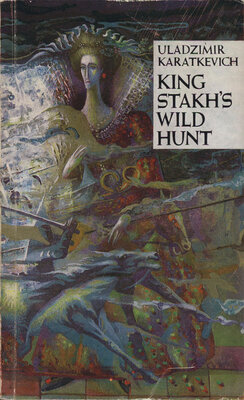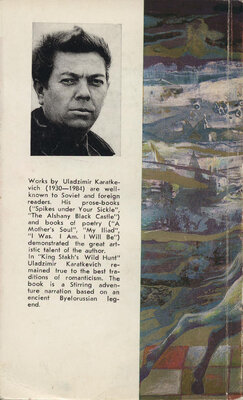King Stakh's Wild Hunt
Уладзімір Караткевіч
Выдавец: Мастацкая літаратура
Памер: 248с.
Мінск 1989
“This was written by her father?” I asked, deeply moved, and I thought that I was eight years old when this little girl was born.
“Yes, by him. You see, he had a presentiment about it... His fate is a proof of the truth of the legend about King Stakh. He knew it, they all knew it, for the curse hung over these unfortunate people like an axe. One will go mad, one will be killed for his brother’s money, one will perish while hunting. He knew and he made preparations for it: he provided the girl with an income, though a miserly one, still an income, found guardians in good time, drew up his will (by the way, I am afraid of this
autumn, many of the Yanowskys did not live to see their coming of age, and her birthday will be in two days, and the Wild Hunt has already twice appeared at the walls of the castle). Roman never left the house at night. But two years ago Nadzeya went to visit Kulsha’s wife, a relative on her mother’s side. The girl stayed there till late. Roman was very nervous when she didn’t come home. And the Kulsha’s house stood near the Giant’s Gap. He saddled his horse and rode off. The little girl returned home with Rygor, the Kulsha’s watchman. But the master hadn’t come. He was searched for. It was autumn, however, the time when King Stakh’s Wild Hunt appeared particularly often. We followed in the tracks of the master’s horse, Rygor and I. I was afraid, but Rygor, not a bit. The tracks led along the road, then turned and began to make loops across the meadow. And Rygor found other tracks on the side.
He is a good hunter, this Rygor is. How horrible, sir! Those tracks were made by twenty horsemen! And the horseshoes were old ones, with tridents resembling forks. Their like has not been forged here for ever so long. And at times the track disappeared, then within 20-30 steps they appeared again, as if the horses had flown across the air. Then we found a wad from the master’s gun, I’d have recognized it among hundred. Rygor recalled that when he was carrying the little girl home, someone had fired a shot near the Gap. We drove the horses faster, for about five hours had passed, the night had grown dark before the dawn. Soon we heard a horse neighing somewhere. We came out onto a large glade overgrown with heather. Here we noticed that the horses of the Wild Hunt had begun to gallop faster. But the master’s horse
had stumbled several times, apparently tired.” Berman’s voice became wild, and broke off. “And at the end of the glade just where the Gap begins, we saw the horse still alive. He was lying with a broken leg, screaming as terribly as if he were a man. Rygor said that the master had to be somewhere nearby. We found his footprints, they stretched from the quagmire. I moved on in their tracks which led to the horse and there disappeared. Here, in the damp earth were dents as if a person had fallen there. And nothing more. And no footprints nearby. The Hunt had turned about two metres or so from this pace. Either Roman had risen or else King Stakh’s horses had reached him by air and taken him away with them. We waited about half an hour, and in the darkness preceding the dawn Rygor clapped himself on the forehead and ordered me to gather heather. I, a man of the gentry, obeyed this serf: at that time he had such authority over me as if he were a baron. When we had lit the heather he bent down over the footprints. ‘Well, what can you say, sir?’ he said with an air of apparent superiority. T don’t know why he had to go away from the quagmire, how he got there,’ 1 answered, perplexed. Then that boor burst out laughing... ’He didn’t even think of going away from the quagmire. He, Honourable Sir, he went towards it. And his feet weren’t at all turned backwards forward, as you are probably thinking. He retreated to the quagmire, from something fearful. You see, right here he hit against the earth. The horse broke his leg, and Roman flew over its head. He sprained an ankle: you see the print of his right foot is bigger and deeper, that means that he sprained his left foot. He moved backwards towards the
quagmire. Let’s go there, there we shall probably see the end.’ And really, we did see the end. With his torch Rygor lit the way for us to a precipice in the quagmire, and he said, ‘You see, here he slipped.’ I held him by the belt, and he bent over the odge of the precipice and then called to me: ‘Look!’ And here I saw Roman’s head sticking out from the brown, oily, dung water of the Gap and I saw his twisted hand with which he had managed to catch at some rotten tree. We dragged him out with great difficulty, but we dragged out a dead man: in these marshes there are often springs in the depths of the pools, and he simply froze there. Besides that, his heart had failed him, the doctor told us afterwards. My god! The fear on his face was so terrible, a fear it was impossible to endure and remain alive! There was a kind of a bite on his hand, his collar was torn off. We tied the corpse to my saddle and rode off. Hardly had we ridden thirty paces than we saw through an opening in the forest vague shadows of floating horses. It was surprising that there were no sounds of hoofs. And then a horn began to blow somewhere from quite another direction, and so stifled, as if coming through cotton wool. We rode on with the corpse, greatly depressed, the horses were nervous,— they sensed the dead body. And the night was, oh! What a night! And somewhere there blew the horn of the Wild Hunt. Afterwards it appeared only from time to time. And now again... The hour of vengeance has come.”
He stopped talking, burying his face in his hands, his white, artistic fingers about twice as long as the fingers of an ordinary person. I kept quiet, but suddenly I lost all patience:
“You should be ashamed of yourself. Men,
grown-up men! And you are unable to defend your mistress. Were it even the devil himself — you should fight, damn it! And why doesn’t this Hunt appear all the time? Why hasn’t it been here since I’ve come?”
‘‘Often though they appear, they don’t ever come on the eve of holy days or on Wednesdays and Fridays.”
‘‘Strange ghosts... And on Sundays?” The desire to give this inert, weak-willed, porcelain fellow a good slap on the face was growing ever stronger within me, for such as he are unable to perform any kind of deed, be it good or evil. They are not people, but grass-lice that choke the flower-beds. “But on St. Philip’s Day, on St. Peter’s Day they appear if they are such holy saints, don’t they!”
“God allows them to on Sundays, for, if you remember, it was on Sunday that Stakh was killed,” he answered quite seriously.
“So what then is He, this God of yours?” I barked at him. “Has He then bumped into the devil? You mean to say that He takes the lives of innocent girls in whose blood there is perhaps but one drop of Roman’s blood?”
Berman was silent.
“A four thousand and ninety-sixth part of Roman’s blood flows in her veins,” I counted up. “So what is He good for, anyway, this God of yours?”
“Don’t blaspheme!” he groaned, frightened. “Whose part are you taking?”
“Too much devilry is going on here, even for such a house...” I didn’t give in. “The Little Man, the Lady-in-Blue, and here, in addition, the Wild Hunt of King Stakh. The house has been surrounded from without and within. May it burn, this house!”
“M’m, to be frank with you, Honourable Sir, I don’t believe in the Little Man or the Lady.”
“Everybody has seen them.”
“I haven’t seen, I’ve heard them. And the nature of the sound is unknown to us. And add to that the fact that I am a nervous person.”
“The mistress has seen him.”
Berman lowered his eyes modestly. He hesitated and said quietly:
“I cannot believe everything she says... She... well, in a word, it seems to me that her poor head hasn’t been able to cope with all these horrors. She... m-m... she’s peculiar in her psychic condition, if not to say anything more.”
I had also thought of that, therefore I kept silent.
“But I, too, heard steps.”
“Wild fancy. Simply an acoustic illusion. Hallucinations, Honourable Sir.”
We sat silent, I felt that I myself was beginning to lose my reason, what with the adventures going on here.
In my dreams that night King Stakh’s Wild Hunt silently raced on: the horses silently neighed, their hoofs landed, and their engraved bridles rocked. Beneath their feet was the cold heather, bending forward, the grey shadows raced on, marsh lights glittering on the foreheads of the horses. And above them a lonely star was burning, a star as sharp as a needle.
Whenever I awoke I heard steps in the corridor made by the Little Man, and at times his quiet pitiful moaning and groaning. And then again the black abyss of heavy sleep, and again the Wild Hunt, as swift as an arrow, galloped across the heather and the quagmire.
CHAPTER THE FOURTH
The inhabitants of the Giant’s Gap were, evidently, not very fond of attending large balls, because it is a rare occurrence in such a corner for someone to inherit a large estate on coming of age. Nevertheless, within two days no less than forty persons arrived at Marsh Firs. I, too, was invited, although I agreed with great reluctance. I did not like the provincial gentry, and in addition, had done almost no work these days. I had made almost no new notes, and most important of all, had not advanced in unravelling the secret of this devilish den. In an old 17th century plan there weren’t any air-vents for listening, while steps and moaning sounded with an enviable regularity each night.
I wracked my brains over all this devilry, but could not think of anything.
So thus, for the first time, perhaps, in the last twenty years, the castle was meeting guests. The lampions above the entrance were lit, the covers on the chandeliers were removed, the watchman became the doorman for the occasion, three servants were taken from the surrounding farmsteads. The castle reminded one of an old Grannie who had decided to attend a ball for the last time, and got herself all dressed up to recall her youth and then to lie down in her grave.
 КНІГІ ОНЛАЙН
КНІГІ ОНЛАЙН


